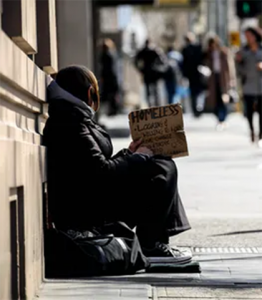Migrants more likely to be homeless – reports
A raft of new reports has exposed the extent of homelessness among diverse communities.
The last ABS Census estimate that 15 per cent of the homeless population are migrants who arrived in the past five years, more than three times the group’s representation in the general community.
 And there are now 116,400 Australians are without a home — the highest number since the census began estimating the prevalence of homelessness.
And there are now 116,400 Australians are without a home — the highest number since the census began estimating the prevalence of homelessness.
Victoria’s 2020 Inquiry into Homelessness in the state heard from the Centre for Multicultural Youth (CMY) that young people from refugee backgrounds are six to 10 times more likely to be at risk of homelessness than Australian-born young people.
The Australian Bureau of Statistics said it had measures in place to accurately measure the make-up of homeless populations in this month’s census.
It said census staff work with organisations supporting culturally and linguistically diverse (CALD) populations to identify homeless people in the community. And they will visit areas where people are known to sleep rough and conduct interviews over a week-long period.
But agencies that work with refugees and migrants said it was hard to know the scope of the problem because housing and support services often don’t record data on cultural and linguistic backgrounds.
And community workers say migrant homelessness is a “hidden problem” because many organisations don’t record Culturally and Linguistically Diverse (CALD) data.
Recent reports from the ABC have revealed instances of migrants sleeping on park benches or in local community centres while waiting for housing
Chief of Australian Multicultural Community Services (AMCS) Elizabeth Drozd says the full extent of homelessness was not known.
Her organisation supports older Australians to live in their own homes. Most of their clients are migrants. Many have experienced insecure housing situations after immigrating to Australia.
“It is not unusual for migrants and refugees not to have anybody here,” she said.
“If something happened and you need help, who can you call at 2:00 in the morning? … Is it only you or your son and daughter?” Ms Drozd said.
Lack of support leaves older migrants vulnerable, especially considering that if they’ve been sponsored by family, many are not eligible for Centrelink payments for up to 10 years.
The CMY report recommended: more investment in affordable housing stock, including emergency, transitional, social and public housing; schemes to ensure private rental accommodation is accessible to people on low incomes; an acknowledgement that young people from migrant and refugee backgrounds are vulnerable to homelessness, and; access to special benefits or social security income for young people young people who are ineligible because of their visa status.
It also recommended more consistent and detailed data collection system for migrant and refugees.
https://dignity.org.au/Home/gclid/EAIaIQobChMI48Szq6uo8gIVkn0rCh1OCAgTEAMYASAAEgIchPD_BwE












